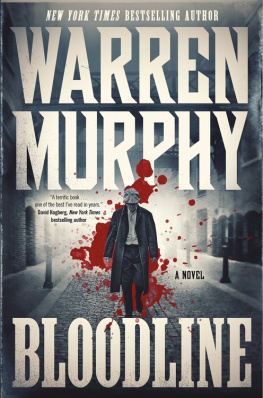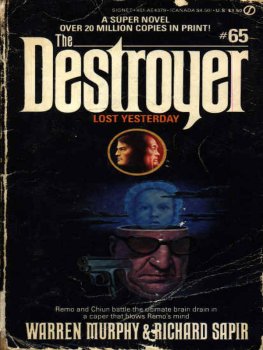Destroyer 71: Return Engagement
By Warren Murphy and Richard Sapir
Chapter 1
He had waited almost forty years for this moment. Forty years. And now the waiting would end here, on this winter day, with dirty snow clotting the road and the sun high and remote and cheerless in the bleak New Hampshire sky.
He touched the lever, and the wheelchair shifted closer to the darkened window. The smell of old oil filled the interior of the van. Down the road, a car neared, weaving slightly from wheels that were out of alignment.
"Is it him?" he called, his voice cracking. Was it just his age that made it crack? Once, it had been a strong voice, a powerful voice. He had been a powerful man with a strong physique that caused the young women to throw themselves at him. But now that magnificent physique was no more, and there was only one woman left.
"Hold on," Ilsa called. She ran out into the road, her body bouncing attractively. Ilsa tossed her long blond hair back from her soft oval face and trained Zeiss binoculars on the approaching car.
"The color is right," she called breathlessly. "Light blue. No, wait. The plates are wrong. Out-of-state plates. No good."
He slammed his left fist down, metal striking metal. "Damn!"
"Don't worry," Ilsa said through the tinted glass as she waved the passing car through. "He'll be along. He always comes to work by this road."
"Never mind that. I banged my hand. It stings!"
"Oh, poor baby. You really should get a grip on yourself."
Ilsa talked at the window. She couldn't see his face behind its smoky opacity. It didn't matter.
"Forty years," he said bitterly. "Actually thirty-eight years, seven months, and five days," Ilsa offered brightly.
He grunted. She hadn't been born then: Then, he had been as young as she was now. Had he known her then, he would have taken her. By force, if necessary. He would take her now-if he had anything left to take her with. Perhaps when this was over, he would find a way to take this foolish girl who had adopted the lost cause of a past generation as her own.
"Another car coming," she said, dashing out into the road again. He watched her. Her black pants were snug, hugging, her shapely girlish figure. Her white blouse was uniform crisp. She wore her armband inside out, so that only the red cloth showed. Even so, it reminded him of the old days.
"Is it him? Is it Smith?"
"Yes," Ilsa said excitedly. "It's him. It's Harold Smith."
"At last."
Harold D. Smith saw the girl first. She stood in the middle of the road, waving her arms.
She was attractive. Perhaps twenty-five or twenty-six, with a beautiful face that needed no makeup. A glimpse of a black lace brassiere showed between two straining blouse buttons. Smith noted these things absently. He had stopped looking at young women as sexual creatures about the time his white hair had started to recede, more than ten years before.
Smith braked his car. Then he noticed the van. It was one of those custorn jobs, painted bronze and decorated with airbrushed designs. It had pulled onto the slushy shoulder of the road. The plastic cover was off the rear-mounted spare tire.
The blond bounced to his side of the car and Smith let the window down. She gave him a sunny smile. He did not smile back.
"Can you help me, sir?"
"What seems to be the trouble?" Harold Smith asked.
The trouble was obvious-a flat tire but Smith asked anyway.
"I can't get the spare tire down."
"Just a moment," Harold Smith said. He pulled off the road, slightly annoyed that he would be late for work. He did not feel up to the exertion of changing a tire, not with what felt like three pounds of his wife's infamous five-alarm oatmeal congealing in his stomach.
He stepped out of his car as the blond came bouncing up like a happy puppy.
"I'm Ilsa Gmos," she said, putting out her hand. Uncertainly, he took it. Her grip was strong-stronger than he expected-and with her other hand she reached behind her back and removed a cocked pistol. She pointed it at him.
"Be nice," she warned.
Harold Smith tried to let go, but she squeezed his hand harder and spun him around. Her knee slammed into the small of his back and he fell against the car hood.
"I must warn you, young lady. If this is robbery-" But then the muzzle of the gun was at his back. He wondered if she was going to shoot him then and there.
"Hold still," she said. Her voice was a bar of metal. She undid her red armband, and, carefully turning it right-side-out, blindfolded Harold Smith. She marched him to the disabled van.
Had Smith been able to see himself just then, he would have recognized the black symbol in a white circle that burned the front of the red blindfold that had been securely knotted around his head. He might have understood then. But then again, he might not have.
"Harold Smith?" His mouth was dry. He took a drink. Why should he be nervous? It was Smith who should be nervous.
"Yes?" Harold Smith said uncertainly. He could not see, but Smith knew he was inside the bronze-hued van. The floor was carpeted, and his bald head had brushed the plush roof as he was forced in through the sliding side door. Cool hands pushed him down into a seat. It swiveled.
"Harold D. Smith?"
"Yes?" Smith's voice was calm.
The man had poise, if not courage. He wondered if that would make it easier. "The first ten years were the worst."
"I don't understand," Smith said.
"The walls were green. Light green above, and dark green below. I could do nothing but stare at them: I thought of you often in those days, Harold Smith."
"Do I know you?"
"I'm getting to that, Smith." He spat the name out. His nervousness was leaving him. Good. Ilsa smiled at him. She was kneeling on the rug, looking like a dutiful daughter, except for the pistol she kept trained on the hated Harold D. Smith.
"We didn't have television then," he continued in a calmer voice. "Television was new. In America, people had television. But not where I had been consigned. No one had television there. So I stared at the green walls. They burned my retinas, they were so green. To this day, I cannot bear to look at grass. Or American paper money."
Harold Smith tried to see past his blindfold. He kept his hands carefully placed one on each knee. He dared not make a move. He knew the blond-girl had the pistol-it had looked like a Luger-pointed at him.
"Eventually," the dry voice continued. "we had television. I think that was what saved my sanity. Television fed my mind. It was my window, for the green room had no windows, you see. I think without television I would have let myself die. Even hate can sustain a person just so long."
"Hate? I don't know you."
"You can't see me, Harold Smith."
"Your voice is not familiar."
"My voice? You last heard it in 1949. Do you remember?"
"No," Harold Smith said slowly.
"No! Not even a stirring memory, Smith? Not even that?"
"I'm sorry, what is this about?"
"Death, Smith. It is about death. My death... and yours."
Smith gripped his knees tighter.
"Do you remember where you were on June 7, 1949?"
"Of course not. No one could."
"I remember. I remember it well. It was the day I died. "
Smith said nothing. This man was obviously deranged. His mind raced. Would another car came along? Would it stop? But this was not a well-traveled road.
"It was the day I died," the voice continued. "It was the day you killed me. Now tell me, Harold Smith, that you do not remember that day."
"I don't," Smith answered slowly. "I think you have the wrong man."
"Liar!"
"I said I don't remember," Harold Smith said evenly. He knew that when you dealt with unbalanced minds, it was better to speak in a calm voice. He also knew that you shouldn't contradict them, but Smith was stubborn. He wasn't about to go along with a madman's ravings just to humor him.
Next page



